65CD - Metamorphic - The Two Fridas - CD plus download
TweetListen
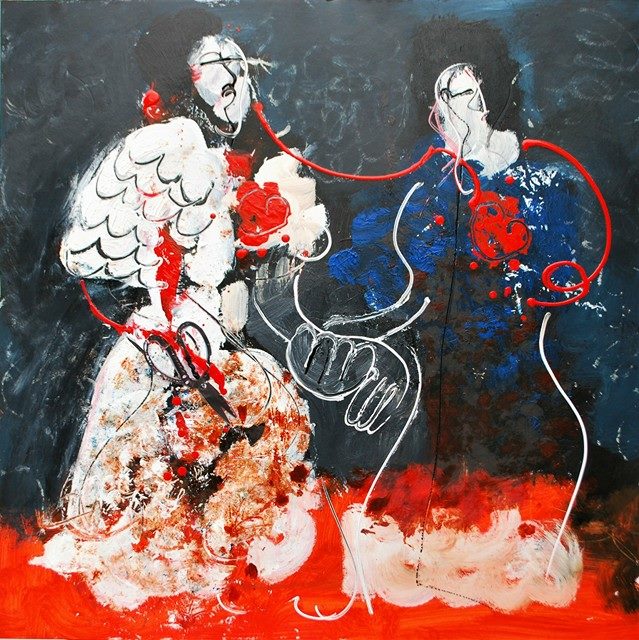
Kerry Andrew, vocals
Chris Williams, alto sax
John Martin, tenor/ soprano sax
Ollie Dover, bass clarinet
Seth Bennett, double bass
Ruth Goller, double bass/ electric bass
Johnny Hunter, drums
Laura Cole, piano/ Rhodes, composer
Metamorphic are an octet of some of the finest improvising musicians in the UK, who play compositions written by pianist and bandleader Laura Cole, based on her emotional journeys and personal experiences. The Two Fridas is their third album; their two previous albums, Coalescence (2013) and The Rock Between (2011) received widespread critical acclaim, with the music described as ‘amazingly original’ (Jez Nelson, Jazz on 3); ‘highly personal and self-revelatory’ (John Fordham, The Guardian); ‘compelling and ear-catching’ (Peter Quinn, Jazzwise); and ‘utterly remarkable’ (Brian Morton, Jazz Journal).
This is a group who really relish playing together, and the sound and intention behind this music is one that has hugely evolved in the ten years the band have been playing together. Metamorphic explore the intensity of collective experience, with Laura Cole’s compositions as a starting point, through spoken word, improvisation and tightly written passages.
Track details
Cellular- This piece was originally written for the improvising big band I used to run with double bassist Seth Bennett, The Bennett-Cole Orchestra. There are four simple musical cells to the composition. What interests me is how, as a band, we move between these cells; the relationship and transition between improvisation and written music.
Deer Medicine- The inspiration behind this piece comes from a dream I had a few years ago, where a beautiful deer bounded into my dreamworld, stopped, and looked me straight in the eye. It was very powerful and felt like a message. The friend I was staying with at the time (who this piece is dedicated to) said that a deer in a dream indicated a new spirit of gentleness. She gave me a text about this significance, which forms the basis of Kerry’s improvised vocals on the piece.
Charcole I- I wrote the poem for this piece following seeing a gig in Brussels, a trio of guitar/effects, duduk and mediaeval instruments/ electronics. The music was incredibly sparse but also very rich and sustained. I loved this juxtaposition. This piece is entirely improvised instrumentally; we had never played it before. I loved the freshness this gave the piece when we recorded it.
The mountains, the sea/ the island- because no one is an island.
Dark Thundering Moon- The title of this piece came from a screenplay my daughter Martha, then aged around 8, was writing a few years ago, with the same title. I asked if I could write the music for her film, and she agreed!
Little Woman, Lonely Wing- The original idea behind this piece came from an imagined meeting between Jimi Hendrix and Ornette Coleman. Little Wing and Lonely Woman are two of my favourite pieces of theirs, and I decided to try and thread the two pieces together, with this imaginary meeting in mind. This is a trio arrangement of the original piece involving the whole band, which appeared on our second album, Coalescence.
26,302- This piece is dedicated to the late Bob Hesketh. Bob was an old family friend, and a close childhood friend of my dad’s; he was a Times crossword compiler, and 26,302 was the number assigned to his last crossword published in the Times before he died. The words in the piece are taken from the clues in the crossword.
Senken- This piece is about cuts. Cuts musically, metaphorically and actually, and how we as musicians deal with this. This piece is dedicated to Corey Mwamba, as an acknowledgment of all the support and hard work he puts into putting musicians on in Derby, in the best working environments possible, despite these cuts.
Digging For Memories- This piece, really a short suite, is about visiting Auschwitz a few years ago. In the days, weeks, months following the visit, I struggled to find an appropriate way to respond to this harrowing experience creatively. I was then given a book called Écorces (Scorched) by the philosopher and author Georges Didi-Huberman, detailing his visit to Auschwitz, expressed through words and photographs, and the inherent difficulties he also faced in terms of how to respond artistically to such an overwhelming experience. In his book, Didi-Huberman includes a quote by the German Jewish writer and philosopher Walter Benjamin, who left Occupied France overland in 1940 with plans to escape on a boat to the US, but became trapped at the border in Northern Spain, and subsequently took his own life. Benjamin’s quote was about digging for memories; about the internal architecture of how and why we remember; and the hidden emotional recesses behind what we remember. I based this piece on Benjamin’s quote, in the spirit of remembrance for all the souls who suffered and died at Auschwitz. The spoken word section of the piece is called The Phoenix, and is a poem I wrote about a dream I had of a Phoenix on the eve of my 40th birthday. I felt the idea of a Phoenix rising from the ashes encapsulated the process behind this piece.
Charcole II- This is version 2 of Charcole, which we recorded immediately after version 1. I decided to include it in the album as I felt both versions had their place in the recording.
The Two Fridas- The origins behind the title track of the album began with a postcard of Frida Khalo’s The Two Fridas landing on my doormat a few years ago, from Robert Wyatt. I had sent our second album, Coalescence, to Robert, and he had written some lovely words of support and encouragement on this postcard. It was an incredibly inspiring and defining moment. As a Gemini, the image of The Two Fridas also resonated strongly. I wrote a poem based on this postcard, Sylvia Plath’s poem Paralytic, and the idea that Frida Kahlo painted so many self-portraits as she was the subject she knew best.
Truth- This is only arrangement on the album, written by and dedicated to drummer Pete Fairclough. When I began playing jazz at age 17 at Sheffield Jazz Workshops, Pete would run some of the sessions. His musicianship and advice during those sessions are still very much with me today; and I am proud to say that I have since played professionally with Pete in a number of different line ups.
Read an in depth interview with Laura Cole by Nick Lea (Jazz Views) here.
The music is jazz inspired chamber music, but with typical English touches, evoking Wyatt, Canterbury, Recommended Records related groups, a.o. The performance is lively and organic, coming from a positive chemistry between the players. Cole composes catchy tunes that are worked out in fine arrangements. Nice job! - VITAL WEEKLY
I sat with these records for many months, attempting to pierce the veil, as it were. Not because British pianist Laura Cole’s music is obscure; on the contrary, her composition style is quite direct and open. Instead, I’ve been taking the time to pierce my personal veil, to pass through my initial surface impressions—extremely positive—to try and reach the core of Cole’s music. To call Cole merely thoughtful does a disservice to the purpose and message of her music: instrumental to her work is a mutually supportive community that strives and struggles collectively, raising each other up like sparks.
This year, Cole released two dramatically different albums. Enough is Cole’s first solo piano album, spanning two discs: “This Is Water,” a collection of compositions by thirteen different artists; and “As Warm As the Sun,” thirteen compositions and improvisations by Cole. The Two Fridas, a double album featuring Cole’s octet Metamorphic, with Kerry Andrews on vocals, Chris Williams on alto, John Martin on tenor and soprano, Ollie Dover on bass clarinet, Seth Bennett and Ruth Goller on bass, Johnny Hunter on drums, and Cole on vocals, piano, and Rhodes.
Despite the difference in sound between the two groups, the singularity of Cole’s musical voice clearly marks both. Metamorphic has been termed a folk/jazz group, though I think that designation may be a little misleading, depending on how you read those genres. It seems one only in the sense that John Stevens and Dave Holland’s 1960s-70s work was folkish. In fact, Stevens seems an important landmark in making one’s way through Cole’s music. Much of Metamorphic’s music brings to mind the Spontaneous Music Ensemble, especially the lengthy improvisations that emerge throughout this album. This is partly due to Hunter’s skittering, percussive style that’s reminiscent of Stevens’s sometimes loose, open playing. But also, there’s a clear through-line to draw from Stevens to Cole and Bennett’s roles in Julie Tippetts and Martin Archer’s ensemble, and that connection seems more pronounced on The Two Fridas than on past albums. Take “Charcole I” and “Charcole II,” two recordings of the same poem, on which Cole takes the lead vocal and the group performs radical, occasionally spiky improvisations.
In many ways, The Two Fridas calls to mind recent chamber-vocal albums by pianists Kaja Draksler and Cathlene Pineda. I had a chance to review Draksler’s octet album , but we did not write up Pineda’s Passing: A California Suite. All three artists create music that explores issues of motherhood and feminism, art and creativity, and the role of an individual within a community (there’s that inescapable word again!). And so when Cole interpolates “Little Wing” and “Lonely Woman” into “Little Woman, Lonely Wing,” the deftness of her composing places her nicely in line with Draksler and Pineda, two pianists who can be equally irreverent and moving.
What’s fascinating about Enough is the many ways Cole brings her community into a recording of solo piano. On the first album, “The Is Water” (its title referencing David Foster Wallace’s famous speech of the same name), Cole arranges and performs a set of compositions mostly from fellow players. To get a clear picture of the range, it’s worth sharing the full list of composers: Martin Archer, Seth Bennett, Miles Davis, Ruth Goller, Nikki Iles, Sarah Jewell, Kim Macari, Robert Mitchell, Corey Mwamba, Julie Tippetts, Chris Williams, Alex Wilson, and Jason Yarde. Cole’s arrangements, and the warm, close recording by Spencer Cozens, brings each piece to life, her playing at times reminiscent of Don Pullen or Myra Melford.
Tracks like “Outgoing Vessels” and the bracing “The Two Fridas”—or the lengthy “forgotten letters; Bereft; Tears: bright grey” and “Digging for Memories”—take listeners to some deep spaces, inspiring and conveying both contemplation and introspection. The very slight difference between external and internal reflection implied there says much about Cole’s music: there is a consistent inside/outside perspective. One gets the feeling that Cole is both working through something and guiding us along, progressing towards a fuller understanding of ourselves and the world. Again, I’m reminded of Stevens, of the gentleness of even the most angular and challenging of SME’s recordings. Cole, like Stevens, makes it seem easy to be this open, but as close listeners, we know nothing is that simple. – Lee Rice Epstein, Free Jazz Blog
When she was six, the painter Frida Kahlo contracted polio. Confined to bed for a month, she made up an imaginary friend who accompanied her for the rest of her life. In her diary she recalled the experience as being the origin of one of her most important paintings The Two Fridas. That double portrait of Frida Kahlo is transformed into a double portrait of composer and pianist Laura Cole in the new double album by her octet Metamorphic. Part spoken word, part sound art, part improvisation, part composition, as a double album it has an almost overwhelming emotional and intellectual heft. The album is, she says, “an attempt to express intimate emotions and thoughts through the creative – and recording – process”. It's an attempt that places significant demands on the listener.
A double album poses significant problems for attention and pacing. They’re often patchworks or sketchbooks (like the Beatles' white album which is currently celebrating its 50th birthday). The Two Fridas seems conceptually coherent, with shape and development, but it does take its time to emerge. Overall it’s a slow, atmospheric listen, sparingly melodic. Many of the tracks start with an atmospheric sense before settling into a theme or groove. The concision of one of the album’s highlights, Senken, coming in at under five minutes, makes for a more satisfying and visceral conception – though in additon to his rapport with bassist Seth Bennett, I’d love to hear more of drummer Johnny Hunter and bassist Ruth Goller together; there’s a real punch when they lock together.
Laura Cole is not only a bandleader, composer and pianist, but a poet. The spoken word elements form the connecting tissue of a journey into an exploration of self-knowledge and overcoming, reflecting her fascination with symmetry and “the double-sidedness of things, maybe as a Gemini”. The title track is the clearest outline of the concerns of the album: “I am the person I know best; it will be better in the knowing.” It also demonstrates some of the characteristics of Laura Cole’s writing, with many tracks using short repeating thematic sections or units.
The long track The Mountains, The Sea / The Island is an opportunity to hear her singular piano inventions. For a full picture you have to hear her recent double album Enough, which comprises a disc of arrangements of others’, and another of originals and improvisations. Her piano playing is lustrous and a touch eldritch, with a distinctive classical sense and a richly developed harmonic sensibility.
Naturally the album has not one but two centrepieces: the title track and the 17-minute suite Digging For Memories, which presents an unfolding of dignified and controlled emotion. Charcole I & II also obey the Gemini tendency, recorded back to back; essentially presenting two sides of the same improvisation. In Little Woman, Lonely Wing Cole weaves together Ornette Coleman and Jimi Hendrix compositions in a way that sounds uniquely her own. As a bandleader Laura Cole is light-handed but inspires discipline in the ensemble. Recorded at Real World, the clear dynamic sound impresses on you individual contributions and the individuality of the contributions.
John Martin specialises in extended techniques on the tenor sax and brings a dash of that grit to forge a strong responsive trio together with Chris Williams from Led Bib on alto sax and Ollie Dover on bass clarinet. Johnny Hunter’s command of pace and dynamics is valuable in these extended structures that start quiet and abstract, and move inexorably toward a groove or vocal ostinato. Vocalist Kerry Andrewalways feels embedded in the group rather than leading, whether singing wordlessly or uttering glossolia, whether whispering or reading the poems.
Surprisingly for an album of this length, this double portrait of deep selfhood raises more questions than it answers. The inspirational work of Frida Kahlo similarly involves a negotiation of the private meanings of public utterances, and there is always some mystery in the most detailed portrait. At their hottest moments of interplay the octet, called Metamorphic, submit the protolithic strata of Laura Cole’s personal experience to the heat and stress of group connection, transforming raw material into fine art. - A J DEHANEY, LONDON JAZZ NEWS
In general, creative style and musical sound are those of progressive English music, Basata su una scrittura musicale che combina limpidi pattern ripetitivi e ritmi serrati e sull' improvvisazione, essa ha in Martin Archer il suo maggiore protagonista e mentore.based on a musical writing that combines clear repetitive patterns and tight rhythms and improvisation. Anche la scelta di combinare gli strumenti alla voce è in linea con questo stile. Also the choice of combining the instruments to the voice is in line with this style. Brani esemplari in tal senso sono The Mountains, The Sea / The Island , Dark Thundering Moon , Senken , il lungo Digging for Memories (ispirato ad Auschwitz e alla morte di Walter Benjamin ) e The Two Fridas (impreziosita da un eccellente assolo di sax). Examples are The Mountains, The Sea / The Island , Dark Thundering Moon , Senken , the long Digging for Memories (inspired by Auschwitz and the death of Walter Benjamin ) and The Two Fridas (embellished by an excellent sax solo) . Una menzione finale va alla bella copertina che riproduce l'interpretazione pittorica, realizzata da Gina Southgate e Gonzalo Fuentes , del dipinto di Frida Kahlo The Two Fridas . A final mention goes to the beautiful cover that reproduces the pictorial interpretation, created by Gina Southgate and Gonzalo Fuentes , of Frida Kahlo's The Two Fridas . – A G Bertinetto, KATHODIK
In the current overall musical climate it’s good to hear artists making heartfelt personal statements and taking musical and creative risks.
You have to hand it to the pianist and composer Laura Cole, she’s not a musician who does things by halves. 2018 has been a big year for Cole with the release on the Discus record label of two, yes, two, double albums.
The first of these to appear was “The Two Fridas”, featuring Cole’s long running group Metamorphic. This was quickly followed by “Enough”, a collection of solo piano performances naturally credited to Laura Cole.
I intend to take a separate look at the solo piano recording so will turn first to “The Two Fridas”, a recording in part inspired by the work of the Mexican artist Frida Kahlo. During a childhood illness (specifically polio) the young Kahlo invented an imaginary friend or alter-ego she kept with her for the rest of her life, this ‘Other Frida’ eventually inspiring the famous painting “The Two Fridas”.
The album artwork features images inspired by the Kahlo painting, the new works coming from the celebrated ‘jazz painter’ Gina Southgate (‘Fridas for Laura on the front cover) and from Gonzalo Fuentes (‘Ride on a pig, then die and go’ back cover).
“The Two Fridas” is the third recording by the Metamorphic group and follows the single albums “The Rock Between” (2011) and “Coalescence” (2013). Both of these albums attracted considerable critical acclaim, and both are reviewed elsewhere on the Jazzmann.
For this latest recording Metamoprhic has, ahem, metamorphosed in an octet with Cole on piano and Rhodes joined by long standing members Kerry Andrew (vocals), Chris Williams (alto sax) and John Martin (tenor & soprano sax). The new look Metamorphic also features Ollie Dover on bass clarinet, Johnny Hunter on drums and twin bassists Seth Bennett (acoustic) and Ruth Goller (acoustic and electric).
Cole’s writing has always been intensely personal and she describes both this album and the companion solo piano work as “an attempt to express intimate emotions and thoughts through the creative and recording process, they aim to tell a story”. Both double albums also reflect Cole’s interest in “symmetry and the double sidedness of things, maybe as a Gemini”.
On both the “Two Fridas” and “Enough” recordings each composition or improvisation is dedicated to a specific person. The first disc, “Frida 1”, commences with “Cellular”, dedicated to saxophonist Jason Yarde and originally written as a large ensemble piece for the band Cole co-led with Seth Bennett, the Bennett-Cole Orchestra, which appeared briefly on “Coalescence”.
Cole says of the piece;
“There are four simple musical cells to the composition. What interests me is how, as a band, we move between these cells; the relationship and transition between between improvisation and written music”.
The music itself commences with what sounds like collective improvisation, the slur of reeds, the rustle of drums and percussion and the grainy sound of bowed basses. Out of this a more obviously written passage emerges with Andrew’s wordless vocals an integral part of the ensemble sound, but that spirit of improvisation still remains close to the fore. Hunter eventually strikes up a propulsive drum groove as the piece enters its next phase, with the horns and Andrew’s voice carrying the melody, as well as sheering off into improvisational jousting. The piece ends as it began with a final brief bout of almost free playing.
“Deer Medicine”, dedicated to Ellen Scrimgeour, was inspired by dream imagery, the deer in Cole’s dream indicating a new spirit of gentleness. Scrimgeour gave Cole a text explaining the significance of this, and those words form the basis of Andrew’s improvised vocal. The powerful ensemble playing is punctuated by an atmospheric piano / bass duet mid tune, this leading to a dramatic closing section featuring increasingly dynamic ensemble passages allied to the elemental power of Andrew’s wordless vocals.
“Charcole 1”, dedicated to Cole’s family, is the first of three wholly improvised pieces and was inspired by a trio gig that Cole witnessed in Brussels featuring guitar, duduk, percussion and electronics. Metamorphic’s improvisation inevitably sounds very different but retains something of that trio’s spirit. There is a pre-composed element, the evocative words written by Cole and whispered, sung and spoken by her, in conjunction Andrew. The sombre, poetic quality of the words is reflected in the scratchy, grainy improvisations of the musicians with eerie bowed bass, the furtive rustle of percussion, the piping of the reeds.
“The Mountains, The Sea / The Island” is a two part, ten minute epic that draws its inspiration from John Donne’s “No Man Is An Island” quote. The leader’s piano engages in dialogue with Hunter’s percussion on the dramatically atmospheric opening passage. Cole’s piano then leads the next section in trio mode, with wordless vocals and reeds gradually added to the arrangement as the piece slowly gathers momentum, Dover’s bass clarinet is a distinctive component here. Layers are added until Hunter establishes an off kilter funk groove that forms the basis for a thrilling series of saxophone exchanges featuring Martin and Williams. The piece ends as it began with Cole at the piano.
The title of “Dark Thundering Moon” came from Cole’s then eight year old daughter, Martha, who was writing the screenplay for an imaginary film. Cole asked if she could write the music for the film, and dedicates the recorded work to Martha. The music is as atmospheric and evocative as the title, beginning with what sounds like a freely improvised passage featuring the deep sonorities of bass clarinet and bowed double bass. From this emerges a brief written section featuring piano and wordless vocals, followed by a more dynamic ensemble passage featuring Andrew’s singing of Cole’s lyrics, the words including those of the track title. Cole takes an extended piano solo, her first thus far, and demonstrates considerable fluency and inventiveness. Hitherto she’s largely been content to be a member of an ensemble where dense writing meets free improvisation and conventional jazz soloing is something of a rarity. It’s back to the ensemble and Andrew’s adventurous but emotive vocalising in a rousing section that includes some dynamic drumming from the excellent Johnny Hunter. The composition then resolves itself peacefully around the sound of the leader’s piano.
“Frida 1” ends with Cole’s ingenious “Little Woman, Lonely Wing”, a splicing together of Ornette Coleman’s “Lonely Woman” and Jimi Hendrix’s “Little Wing”, conceived after Cole envisioned an imaginary meeting between the pair. It represents one of Cole’s numerous “hybrid” pieces where she splices the music of two different composers together, linking them with compositional ideas of her own. This piece first appeared as a full band performance on “Coalescence” but is here revisited in the piano trio format featuring just piano, bass and drums. In this sense it’s one of the most ‘conventional’ performances on the album but it’s still a fascinating listening experience that casts the music of Coleman and Hendrix in a new light and offers further evidence of Cole’s considerable pianistic abilities (the piece is dedicated to fellow pianist Alex Wilson). Hunter and the bassist (presumably Bennett, both arco and pizzicato techniques are deployed) also impress as they offer empathic support in a highly interactive trio performance.
“Frida II” commences with the brief group improvisation “26,302”. The piece is dedicated to the late Bob Hesketh, a long standing friend of the Cole family who was a crossword compiler for The Times. Number 26,302 was the final crossword that he compiled for the paper and the words that are spoken and sung derived from his clues, so he gets a writing credit of sorts. The music consists of clues spoken by a range of female and male voices, the speakers being Andrew, Cole, Goller, Dover and Williams. The music features both plucked and bowed double bass, presumably Goller and Bennett working in tandem.
“Senken” is dedicated to Corey Mwamba, the Derby based vibraphonist who acts as producer on Cole’s solo piano album “Enough”. “Senken” is about cuts” declares Cole, “musically, metaphorically and actually, and how we, as musicians deal with this”. It commences with the pure sounds of Andrew’s wordless voice, this soon joined by double bass and a choir of reeds. The addition of drums gives the music urgency and heft and spurs Andrew into a more abstract and aggressive style of vocalising that is extremely effective. A second, more animated horn chorale, leads into a powerful closing section braying horns, Goller on electric and powerful, rock influenced drum grooves. There’s even time for a more impressionistic coda of voice and Rhodes on a piece that crams a lot of information into its four minutes forty seconds duration.
“Digging For Memories” is this disc’s epic, a seventeen minute suite inspired by the harrowing experience of Cole’s visit to Auschwitz. The title is a quote from the German Jewish writer Walter Benjamin who fled from Occupied France intending to escape to the US but became trapped at the border in Northern Spain, eventually taking his own life. Cole’s composition is dedicated to the philosopher and author Georges Didi-Huberman who also visited Auschwitz and similarly struggled to find an appropriate artistic response. Cole’s composition is a powerful piece of work featuring some rousing ensemble playing, initially led by Andrew’s strident wordless vocal but also featuring strong contributions from Cole, the reeds and drummer Hunter. A relative calm after the opening storm features an impressive pizzicato double bass solo. The piece also includes a spoken word section as Cole’s poem “The Phoenix”, with its images of fire, ash and rebirth is convincingly delivered by Andrew. The music that follows this is suitably atmospheric and reflective with unsettling saxophone multiphonics. The closing section is ushered in by a double bass motif, the mood of the piece subtly altering as the music gathers momentum, becoming positively anthemic as Andrew’s voice soars and the twin saxes take flight.
“Charcole II” represents a second setting of Cole’s poem and was recorded immediately after the first version. Cole decided that both takes were worthy of a place on the finished recording. The mood and many of the musical elements remain the same. Cole dedicates the performance to the saxophonist Tony Kofi.
The title track draws on some unique sources of inspiration. At the time of its release Cole sent a copy of “Coalescence” to the great Robert Wyatt. Wyatt was suitably impressed and forwarded a postcard to Cole offering words of support and encouragement. The visual image on this card was of the Kahlo painting “The Two Fridas”. Inspired jointly by Wyatt’s words, the poetry of Sylvia Plath and by Kahlo herself Cole wrote the poem that forms part of this piece, her words imparted by Andrew, accompanied by bowed bass and delicately nuanced drums and percussion. Cole references the fact that Kahlo produced so many self portraits with the line “I am the person I know best; it will be better in the knowing” appearing in the lyrics and on the album packaging. It’s a good quote but its unfortunate that not all of Cole’s words are reproduced within the package, the full text would certainly add much to the listener’s appreciation and enjoyment of the music. Initially the music is reflective and introspective but the mood changes in the later stages of the piece as Williams and Martin go head to head as the mood and momentum of the composition changes, their playing perhaps a reflection of the underlying theme of duality. The piece resolves itself with a return to the spoken word and a reprise of Cole’s poem and is dedicated to Wyatt.
The closing “Truth” is the only non-Cole original on the recording. It was written by drummer, composer and educator Pete Fairclough, a hugely influential figure on the jazz scene in the North of England. Cole was once one of Fairclough’s students but has since played professionally with him. Her arrangement of Fairclough’s piece is dedicated to its composer, and is clearly a homage to a truly inspirational figure. Soft reeds and gently brushed drums help to give the piece a pastoral air. It’s uncannily beautiful and represents a delightfully peaceful conclusion to an often turbulent album.
“The Two Fridas” is arguably Cole’s most ambitious and personal recording to date. More than with most jazz musicians one feels that for Cole the creative process is a very necessary source of catharsis. Thus her sound-world is very much her own with musical, literary and other influences coming together. It’s sometimes a demanding listen, and for this reason her music will only suit so many people’s ears.
Personally I applaud her originality, individuality and ambition, although even I have to admit to finding it a difficult listen at times. That said its best moments are highly rewarding and in the current overall musical climate it’s good to hear artists making heartfelt personal statements and taking musical and creative risks. -IAN MANN THE JAZZ MANN
LAURA COLE’s group, Metamorphic has issued THE TWO FRIDAS [Discus Music 65cd]. This 2 CD set contains a series of 12 dedications [96:45] with occasional narration and voices on Laura Cole’s [p] compositions. Having spent some time with this set I remain ambivalent about it. I could do without the vocal interjections but I found the compositions rather powerful in their winding and unwinding. Cole’s music builds in big sweeping motions leaving room for free improvs. I found myself emotionally riding these waves of compositional rounds which were punctuated by improvisations from the group [Chris Williams-as, John Martin-ts/ss, Ollie Dover-b clt, Seth Bennett-b, Ruth Goller-b, Johnny Hunter-drm]. Music that transports. - CADENCE
The Discus label is the brainchild of Martin Archer who will be well known to regular readers of ‘Acid Dragon’ from previous reviews. Martin’s prodigious effort in releasing his own music and supporting the music of others is well known and much appreciated. ‘Metamorphic: The Two Fridas’ (Discus 65 CD) is by keyboard player/ producer Laura Cole, the ‘brainchild’ behind a project based on ‘The Two Fridas’ by Frida Kahlo. This release consist of two CDs all Cole originals apart from final number ‘Truth’ composed by Pete Fairclough, ‘Little Woman, Lonely Wing’ which is an amalgam of Jimi Hendrix’s ‘Little Wing’ and Ornette Coleman’s ‘Lonely Woman’ and three group improvisations entitled ‘Charcole I’ and ‘Charcole II’ and ’26,302’. Each track is dedicated and the inclusion of a piece loosely based on Ornette Coleman gives a clue to the ‘free jazz’ direction of the music with opener’ Cellular’ a kaleidoscope of saxes, bass clarinet and double bass becoming slightly Magma like as it progresses, a happy coincidence perhaps. ‘Deer Medicine’ is a lovely piece based on a haunting piano motif and Kerry Andrew’s enchanting otherworldly vocalisations. The barely perceptible whispered beginnings of ‘Charcole 1’ stray into the recitative/ poetic (as with all the improvisations) but ‘The Mountains, The Sea/ The Island’ is altogether more demonstrative, a subtle, superbly executed piece with the whole gamut of instrumentation erupting in accelerando from its piano introduction. ‘Dark Thunderous Moon’ is a highpoint for me on CD 1, another overtly jazz offering with wonderful piano passages of play and vibrant drumming form Johnny Hunter, the vocals resembling Annette Peacock in style. Bass, cymbals and piano introduce ‘Little Woman/ Lonely Wing’ and the ‘groove’ demarcates the Hendrix part, another considerable achievement in interpretation and execution. So far, so good, but what of the second CD? ‘Senken’ navigates successfully into jazz rock territory with Ruth Goller on electric bass this time. ‘Digging for Memories’, full of twists and turns, is the longest piece on the album at over 17 minutes; the title track, dedicated to Robert Wyatt, doesn’t disappoint while the album ends with a gorgeous slow waltz (‘Truth’). ‘Metamorphic: The Two Fridas’ will appeal to those who appreciate music that is full of expressionism and who can tolerate occasional dissonance. It is an emotional roller-coaster of an album as I expect it was intended to be. - Phil Jacksn, ACID DRAGON
Metamorphic is mainly a jazz-improvising project for showcasing the talents of Laura Cole, pianist and arranger/composer who has often appeared in Archer’s groups such as Engine Room Favourites and Deep Tide Quartet. Her double-disc set The Two Fridas (DISCUS 65CD) is a collection of warm group compositions, featuring the playing of Chris Williams, Ollie Dover, Seth Bennett, Ruth Goller and Johnny Hunter, plus the vocal talents of Kerry Andrew. Matter of fact all the players contribute voices, either to the song-based works or to the poetry / spoken word pieces, most of which appear on the second disc. Cole is as much a poet as she is a composer, and she draws inspiration from her dreams, from her own imagined ideas, and from suggestions supplied by her family and friends. I thought at first the record might be intended as a tribute to the life and art of Frida Kahlo, but now I’m not sure if it is; the content seems to be mostly about Laura Cole’s life in jazz, her friendship with Robert Wyatt, and a story that involves a postcard of the famous Frida Kahlo painting in some way, and her writing a poem about it. Most of the music here is quite lush, rich, and boasts the same sort of dynamic arrangements as we find on records by Engine Room Favourites, and there’s a strong interest in melody and structure. I’ll admit I’m less keen on the poetry-based recitative pieces, but even the minimal music backdrops for these are effective. - Ed Pinsent - SOUND PROJECTOR
Tak je tomu hned u dvojalba anglických Metaphoric skladatelky, autorky většiny textů, pianistky a hráčky na Rhodes Laury Cole The Two Fridas. Předcházely mu dvě jejich desky – The Rock Between (2011) a Coalescence (2013) – a už ty kritika označila jako pozoruhodné, originální a vysoce osobní. Album, nahrané 27. až 29. ledna 2017 v Real World Studios, obsahuje většinou Coleiny skladby, dva převzaté opusy a tři improvizace kolektivu, který sestává z vokalistky Kerry Andrew, altsaxofonisty Chrise Williamse, tenor a sopránsaxofonisty Johna Martina, basklarinetisty Ollieho Dovera, kontrabasistů Setha Bennetta a Ruth Goller (která ji prostřídává s elektrickou basou) a bubeníka Johnnyho Huntera. Každý ze dvanácti počinů je někomu věnován; uvedu alespoň jako příklad titulní skladbu, která je zasvěcena Robertu Wyattovi.
Že by nás čekalo nějaké šolíchání, to vyvrátí hned vstupní Cellular, do něhož muzikanti vjedou naplno, s jasným vyhlášením, že porozpojovaný celek bude sirénově klouzavý, vypínavě spádný, zakružovaně hloučivý, poličovaný vášnivými saxy nad řádivými bicími, a hned zase povzdyšně pohružovaný s klavírními vpichy nebo hořekujícně kormutlivý s volavým hlasem a s jeho přípodotky, přičemž průběžně se prolíná skrumážní horoucnost. Deer Medicine však už vyjeví, že Cole čerpá pro své kompozice inspiraci v osobních prožitcích, což tu odtajňuje (vlastně odtajemňuje) s nadsadivou propočítávostí (nikoli vypočítavostí!), s probortěnou sesuvností, zavinovaným a rozvinovaným vysumírováváním zdvojeného vokálu, pořicovaně sčítavého a podsekávaného bicími. První improvizovaná varianta Charcote má svou vysondovávanou pošeptnost, plnou vybuzovaného napětí, zajíždivou s drobnými protřeskutáváními i zadíravými povrzáváními. Definitivnost napětí udržuje vokál, dobrouzdávaný saxy a doklepávaný perkusemi. Vytrvalostně, téměř bezbřeze. Zopakování na druhém disku ještě více navodí atmosféru neznámého tajemna a nepředvídané záhadnosti, podtrhované zápletnou basou, náhřmotně šifonérující do zašifrovávané zápernosti, ale je to vysvobodivě sdílný vokál, který pozbaví hudbu hávu neproniknutelnosti, je vyladivý, aniž ztrácí neochotu přiznat vše, co by chtěl/měl sdělit. The Mountains, The Sea / The Island má svoji rozhlednou krajinomalebnost, rozparcelovávanou s nabízivým rozvinováním, rozehrávání se tu vzchopí do rytmičnosti a melodičnosti, je střídavé, odličující i pospojivé s (ne)naléhavým vokálem, hudba hrne před sebou jeho výbludnou problouznivělost, bicí rozbržďují a přikotlávají, ostatní jim proúsporněně na(d)bíhají a jejich potměšilé vrdlouhání, tu vypolíčkované, tu vypolstrované, zajíždí do nicoty. Dark Thundering Moon, věnovaný dceři Martě, se vyhoupne z utrhovačného záskočnění s rozkolísávanou basou, jeho vymknutostní vyhmatávání je zádrhelně znicotňované, smrákavé i znovu rozjitřňované s otevřenými ataky dechů, ale důsažný vokál je to, který nad zapojivě zaplnivou hudbou, na(d)sazovaně vypínavou i odpínavou, nasměrovává znění a vyznění skladby až k pomezí vyčerpání; vše pak dovysvětlí klavír. Titul Little Woman, Lonely Wing zní zdánlivě nevinně, vpravdě však jde o rozporné zpřeházení značně protikladných skkadeb Ornetta Colemana Lonely Woman a Jimiho Hendrixe Little Wing, což samo o sobě by mohlo být disparátní, nicméně Cole je pojímá s imaginárním obhlédáním, s popojíždivým vnucováním vynucováním a se zdánlivým poklidem, zápočtově zvýrazňovaným odhodlávaným klavírem a provrtulovávanými perkusemi. Záludné záklidnění se teprve postupně zahutňuje, a z(a)viřuje s vyčkávavou rozporností, která posléze (s)rázně doskonává v nenadsadivé, zato vytroufalovávané lapidárnosti.
Za další žaluzii osobních momentů vnikneme skladbou 26,302, věnovanou rodinnému příteli Bobu Heskethovi, křížovkáři Timesů, a skutečně mi tato drobná improvizace připadá jako dohadovačná či přihazovačná rozmluva, k čemuž přispívá dialog basy s bicími. Vytěkávané prozpěvování se samorostlým dohráváním, odsekávaným do rozpustilosti a hned zase povzdychávavě provzdušňovaným a hned zase uchvátaně zmatkujícím a hned zase rozkřičně zahandrkovaným – to je letmý náčrt Senken. Tato úsečná rozpojování, vykolotočovaná do závratnosti a vytřešťovaná do zádernosti, se posléze upokojí, obšolíchávana zpěvem, a dohauzírují k vyvanutí. Nejrozsáhlejší a nejzávažnější na tomto dvojalbu je více než sedmnáctiminutové Digging for Memories, suitově ztvárněná vzpomínka na návštěvu Osvětimi, doznívající dlouhodobě ve skladatelčině mysli a znovuzpřítomňovaná i četbou knihy Écorces filozofa Georga Didi-Hubermana a inkluzívní pasáží německožidovského spisovatele Waltera Benjamina o vzpomínce na všechny, jejichž duše (ano, autorka říká: duše) zahynuly v koncentračním táboře. S propojením vlastní básně Phoenix, prodramatizovávající celé dění, tajemně odvyprávěné a zhmotnělé do hudby, celá suita, ve které se hlas zezásnubňuje s nástroji do hymnizované poletušnosti, zesilované i zpomalované, protřepávaně zmítané, kvazivelkokapelové, proklíčovaně prokličkovávané a náruživě dobíjené bicími, mi připadá, jako by byla odvyprávěna a odehrána mezi čtyřma očima. Basklarinet k tomu dodává pocit paměťového prohlubnění, vytřibovaného odtajňování, rozedmutě odhodlávaného mutýrování, pozamykávaného a hned znovu pozotvíraného, pozatěkávaného i vytěkávaného. Celková zmítavost je uvážlivá, jako by si účinkující chtěli znovu zopakovat, co měli na mysli, což basa protraverzovává a klavír opáčí, ale vlastně všechny nástroje se s neutuchajícím přihrnováním různě přifařují a dobarvují motivy a předěly mezi hláškovostí vokálu, dokud se celé téma nezakolébá do náhlé konečnosti. Právě autorčino osobní zaujetí činí z kompozice mimořádně naléhavé dílo. Zdánlivá namátkovost další skladby, The Two Fridas, je bezděčně rozdějovaná, hlas je recitativnější a hudba má svůj nezaměnitelný podíl na každém slově, každý zvuk, jeho zesílení nebo sesunutí se zdá mít svůj význam, svoji pozici i opozici, v souzvukovosti celku se nesvěřuje pouze hlas, ale proporčnost každého nástroje je dynamická, občas drtivě střemhlavá, občas prohrnovaně zaháčkovaná, nicméně hlas vždy zavévodí (a to právě může zmiňovabého Wyatta připomenout), s důrazem na každé slabice důkazně průkazně záležitost s jistým grimasováním vysvětlí nebo naopak vysvětlení zamezí. Závěrečná Truth, skladba bubeníka Peta Fairclougha a jemu zde také věnovaná, je rozebíhavě proakcentovávaná, návlačná a zpozorněně zponorněně roztrušovaná. Její netirádové proklidnění a zpokornění jako by chtělo téma záminkovat, něco namítat a něco zamítat, ve skutečnosti však se mi jeví, že míní celou záležitost uzavřít jakoby mimochodem a celé zakončování zahodit, jako by vše mělo plynout dál (v mysli posluchače?).
Někdo mi může namítnout, že skladatelské přístupy a aranžérské postupy jsou obdobně započínané a rozvíjené, že jsou vždy nějak vygradované i pozastavované, jenže pozor, každá z těch kompozic (nehledíc na improvizační celky nebo zaimprovizování uvnitř skladeb) je jinak prosměrovaná, má odlišnou intenzitu, nasazení, probarvení, sólistické úlohování, jinak řeší vůdčí roli toho kterého nástroje. Byť tedy základní kadlub kompozic může mít obdobnou rozvrstvenost, výsledné znění je zcela svéprávné a pokaždé jinak zakošatělé. Právě proto je celkový přístup formace Metamorphic tak přitažlivý, tak přitahující i vtahující. - ZDENEK SLABY, HISVOICE
Un album (double) qui mérite le déplacement et qui nous est arrivé grâce au hasard des rencontres et la magie du bouche à oreilles : « The two Fridas » par METAMORPHIC, un octet de musiciens du Royaume-Uni rompus à l’improvisation à partir des compositions de la pianiste et leader Laura Cole. On est plus ici dans le domaine de la musique expérimentale que du jazz et les ambiances créées par le groupe ne sont pas sans nous rappeler l’époque de Meredith Monk et quelques autres. Le mieux est de se laisser surprendre. - Guy Stuckens, Radio Air Libre





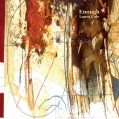 71CD - Laura Cole - Enough - CD plus download
71CD - Laura Cole - Enough - CD plus download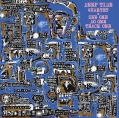 64CD - Deep Tide Quartet - See One, Do One, Teach One - CD plus download
64CD - Deep Tide Quartet - See One, Do One, Teach One - CD plus download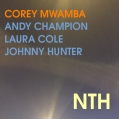 86CD - Corey Mwamba - NTH - CD plus download
86CD - Corey Mwamba - NTH - CD plus download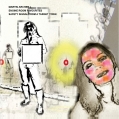 66CD - Martin Archer + Engine Room Favourites - Safety Signal From A Target Town - CD plus download
66CD - Martin Archer + Engine Room Favourites - Safety Signal From A Target Town - CD plus download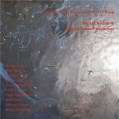 50CD - Martin Archer & Engine Room Favourites - Bad Tidings From Slackwater Drag - CD plus download
50CD - Martin Archer & Engine Room Favourites - Bad Tidings From Slackwater Drag - CD plus download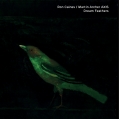 88CD - Ron Caines / Martin Archer AXIS - Dream Feathers - CD plus download
88CD - Ron Caines / Martin Archer AXIS - Dream Feathers - CD plus download